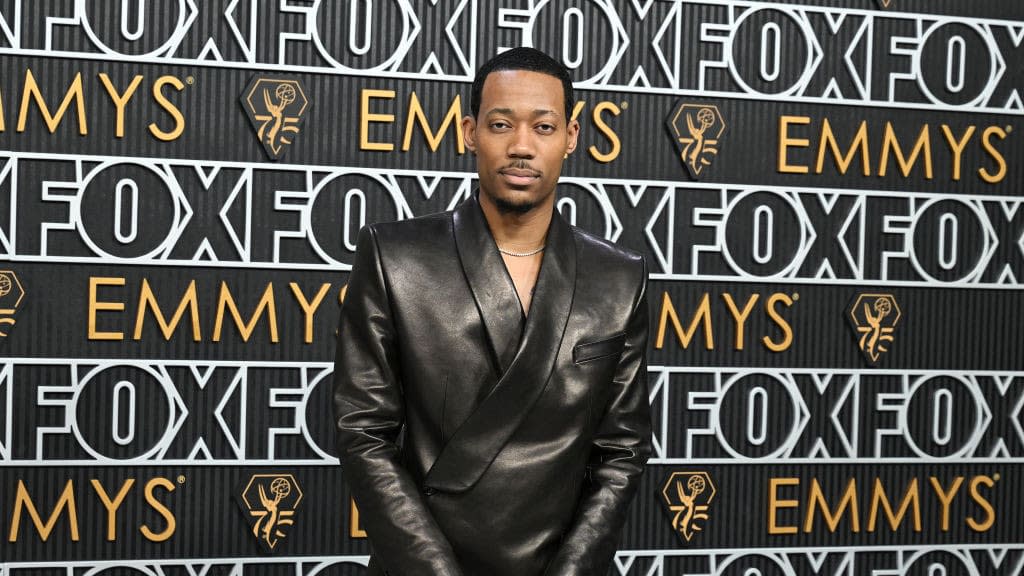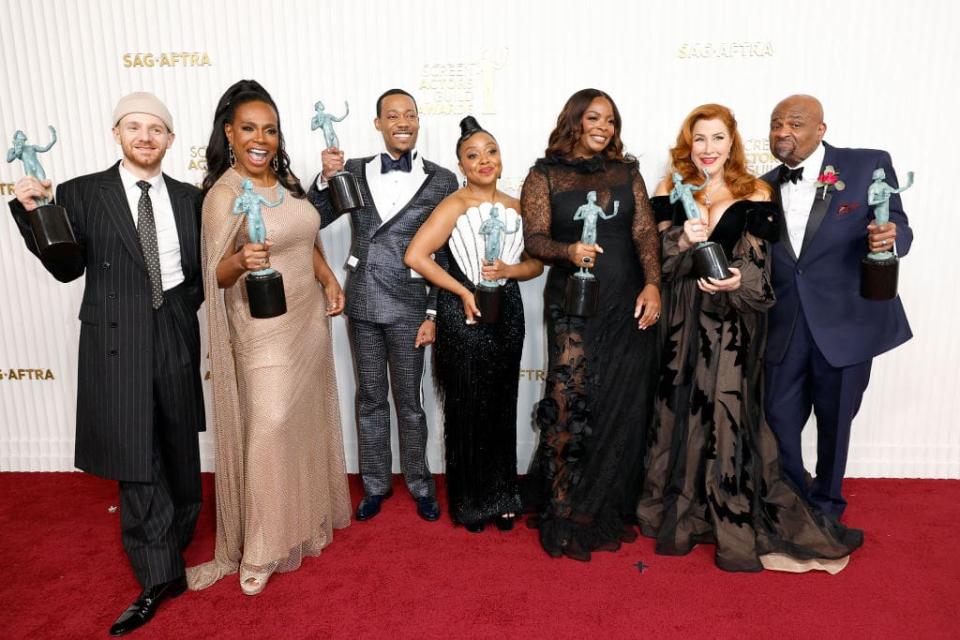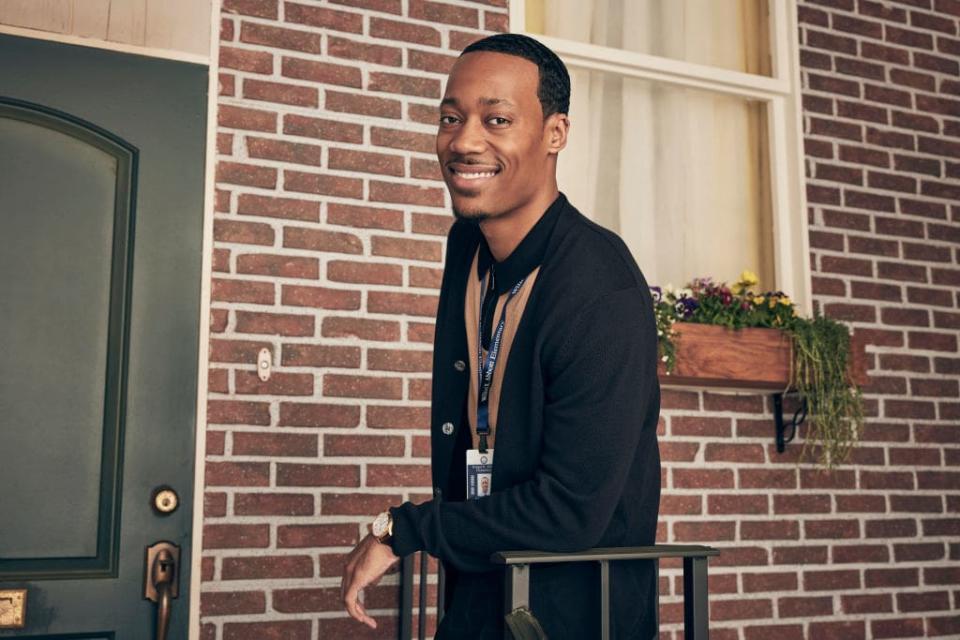Tyler James Williams: Black comedy shows get less respect but, "We're not going anywhere"

- Oops!Something went wrong.Please try again later.
- Oops!Something went wrong.Please try again later.
- Oops!Something went wrong.Please try again later.
- Oops!Something went wrong.Please try again later.
An esteemed actor and rising fashion guru, Tyler James Williams keeps fans glued to his every move and it looks like everyone now loves Chris (well, Tyler).
The “Abbott Elementary” star is in the midst of the hit comedy series’ season three return, following Quinta Brunson becoming the second Black woman in 40 years to win the Lead Actress award at the 2024 Emmys. Williams partnered with the Motion Picture And Television Fund (MPTF) and Johnnie Walker this year to support the ongoing work of the charitable organization, which offers assistance and care to those in the entertainment industry with limited or no resources.
In a conversation with REVOLT, the actor spoke about the partnership, returning to work after the WGA and SAG-AFTRA strikes, how he and Brunson didn’t think she would walk away with the gold, and the lack of love Black-centered programming receives in Hollywood.
Check out the exclusive interview with Tyler James Williams below.
You’re becoming a red carpet fashion icon. What is the inspiration for your looks? What conversations are you and your stylist having?
Due to being in this industry for a long time, I’ve been at these award shows since I was in high school. Outside of celebrating the work that’s been done throughout the year and supporting people in that way, award shows can be a bit dull, honestly. I don’t get excited about the show until I figure out what I’m wearing. It needs to be something that gets me out of the bed. It has to be something that’s unique – my stylist understands I don’t want to see a black suit and if I do, it needs to be strange. My overall goal is I’m looking for something that excites me, that’s a risk, that’s a choice. I want to work with brands who go the extra step and not play it safe. Dimension is big for me, too, as I have a small waist and wide shoulders, so it’s something we can play with upon a traditional suit and make it more of a moment. It’s a lot of tight work with [Ilaria Urbinati], but she loves taking the risk as well.
As 2024 kicked off, what was one thing that had you doing a deadpan stare like your “Abbott Elementary” character, Gregory?
The year started off in Mercury retrograde. I was like, “Hmm, so this is how we’re starting things off…” (laughs) — with award season being in the midst of that because all types of stuff messes up. There’s an array of miscommunication about so many things.
How have “Abbott Elementary” and “Everybody Hates Chris” challenged you as an actor?
Starting in network television almost 20 years ago and then coming back to network television, [there] lies a challenge to keep it fresh. I think people counted the network out as a stale medium. In a way, we witnessed that at the Emmy Awards where [“Abbott Elementary”] was the only network show nominated in major categories. They took time to celebrate the older network shows that really didn’t get their just due. The challenge is not just bringing authenticity to these characters, but finding a way to do so when you have a 22-episode season, staying within the FCC guidelines, and having only 22 minutes and 40 seconds to get the job done. So, the challenge is to keep it fresh, new, and alive, so we can come back year after year and continue to celebrate television.

We went through two strikes this year, and I remember the first time I went through the strike with “Everybody Hates Chris,” and then having to go through it again last year with “Abbott Elementary.” A lot of people and shows didn’t come back because either the networks decided to pivot directions or [there was a] lack of a support system. The challenge is finding ways to keep it active and still in the conversation as an art form. This is why I partnered with Johnnie Walker this year to celebrate and support these shows — because we just came back from a strike. I would be remiss to be on network television, and watch what strikes can do to an industry and a community, and not celebrate the resilience here. This is why I love network television comedy, especially, as an art form.
How did the strikes impact you and your thought process as an actor?
As the industry evolves and continues to do so, what used to work isn’t going to continue to work – it’s like any art form. You have to expand and when you don’t, things can get stale and you’ll lose your audience. I did want to come back and approach everything differently – I wanted to explore warmth in the indie film space, the dramatic awards contender space, and the comedies for cable. I wanted to see all of that, so I could bring it back, and make it a part of my repertoire and dig deeper into my bag. Keep things new and exciting, so the audience doesn’t get lost either.
What are your hopes for SAG-AFTRA’s future?
I hope the support system gets stronger. I’ve watched strikes push people to the edge, and I hope any organizations that come together are there to help and support that group of people and celebrate them at the same time. The award ceremonies aren’t about just giving out trophies to a select few who happened to do what we call “elite television,” but celebrating the entire community. Not celebrating them by loving them with praise – literally stepping in and supporting them. This is why I think this partnership, particularly, was important at this time because we needed that celebration of the ending of a very rough period, which is why I’m kind of here at this point.
Was there a part of Chris Rock’s life that resonated with you while playing the younger version of the comedian? Did you ever tell him?
I think what resonated was something that resonated with everyone — it wasn’t something particularly unique, which makes the show stand the test of time. I’ve seen and heard so many people comment on the show and how relatable it is, with some people not being born at the time and watching it years later, let alone live in the ’80s. Those experiences are inherently relatable. I think it was one of the perfect gigs for me because it showed me that actually acting isn’t as complicated as people make it to be. It’s finding a commonality with you and the character, not the differences.
As far as telling Chris Rock, I think he just saw me onscreen and knew. I recently stumbled on an episode and noticed there’s a natural fluidity here – it’s a boy’s experience growing up and that’s what makes it work because they distilled that experience; although [it’s] specifically his life, the commonality is the same.

There’s been discourse about Black shows not being appreciated in Hollywood — for instance, the lack of applause for the “Martin” cast at the Emmys and “Rap Sh!t” getting canceled. How do you navigate a space that isn’t necessarily set up for the success of Black talent?
Really, a lack of applause for the cast of “Martin”? I heard the applause in the Black section (laughs). This is a really interesting, conversational question because what happened in that moment was unique. When “Everybody Hates Chris” was on, we didn’t have our awards run journey and it didn’t really happen. We got one Golden Globe nomination for season one and I believe that was it. The first thing I noticed with the “Martin” cast was seeing Tichina Arnold up there and I said to myself, “This should’ve happened a long time ago.”
I think Quinta’s win is a sign we’re headed in the right direction, and it would be ridiculous to say there isn’t a lack of equal respect, particularly for Black comedy. It’s always been there. I think that’s just another one of those points that was happening onstage — we’re talking about “Martin” who has had 100-plus episodes and just lives on residual land. It has reruns that come on over, and over and over again, which is the true test of the show. Although the awards may not always reflect it, people are still watching “Martin,” “Good Times,” “Fresh Prince Of Bel-Air,” “Everybody Hates Chris,” and “227” with the people still watching “Abbott Elementary.” We’re here, we’re not going anywhere, and we will stand the test of time. Whether we get recognized now or years later is not a conversation for us — we’re just gonna keep making what we’ve always made, which is good comedy.
What have your many years of being an actor taught you?
That’s a great question, Ty. I feel like I grew up in an industry that was very competitive and a lot of times, that can be the undertone of the industry. I believe we have another choice, and that’s support. We need to enable people to be able to continue that work and support them to be able to do that. Again, reasons why I partnered with Johnnie Walker — because during the strike, we all lost the ability to be able to do that. Coming back to work, it’s really easy to fall back into this idea that it’s going to be competitive again… Everybody has to fight for their space. We can have an option, though, where we support one another, not only emotionally and creatively but financially, so that people can get back to doing their best work, so that the industry can stay healthy. That’s why this partnership is important. To me, it’s keeping the industry healthy and hopefully, it’s a part of the conversation.
You were nominated for an Emmy this year for “Abbott Elementary.” Do you ever go into award ceremonies with high expectations of walking out victorious?
I know it sounds cliché, but the honor is to be nominated. There are hundreds of shows on television, with thousands of performers, with only about six to eight nominees in a category, and if you somehow became a part of that list, that’s it. It doesn’t really get higher than that because beyond that, we’re splitting hairs about who won in my category this year, which had a bunch of incredible performers who deserved to be honored in some way. Never anticipate a win at all – like, Quinta’s reaction to her win was real. We were talking about it earlier in the day and it was like, “I don’t think you got this” (laughs). I think the point of all these things is — and what people need to remember is — it’s a celebration. It’s not about who won or lost – we’re celebrating television, we’re celebrating we’re still here, and doing every little bit they can to move the conversation forward, both onscreen and off. I think a lot of people at home don’t understand that we’re never like really, truly upset with each other over a win – everyone knows everyone does really good work.
What actor would you love to be in a film with? Who would direct and what would be the plot?
I would love to work with Eddie Murphy and Jeffrey Wright. As far as the plot, no idea honestly. It can be anything – when you have two actors committed to making a scene in one room, you could read a phone book.
In addition to fruit, what’s another “No” for Tyler James Williams’ pizza toppings?
When it comes to pizza, anything outside of the realm of pepperoni and cheese is wild to me. We don’t need a salad on top of the pizza and I don’t understand why people are doing that. Generally, a “No” for me, specifically — I don’t like chocolate and I’m not a fan of it. You can crucify me for it. It’s fine (laughs).
Trending Stories

